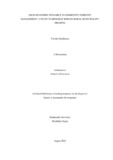
Please use this identifier to cite or link to this item:
https://hdl.handle.net/20.500.14301/476| Title: | Socio-Economic Dynamics in Community Forest Management: A Study in Benighat Rorang Rural Municipality, Dhading. |
| Authors: | Upadhyaya, Yurisha |
| Citation: | Upadhyaya,Y.(2024).Socio-economic dynamics in community forest management: A study in Benighat Rorang rural municipality, Dhading. |
| Issue Date: | Aug-2024 |
| Publisher: | Kathmandu University School of Education |
| School: | SOED |
| Department: | Department of Development Studies |
| Level: | Masters |
| Program: | KUMSD |
| Abstract: | Community forestry in Nepal has demonstrated substantial success in enhancing forest conditions and improving local livelihoods through the widespread adoption of Community Forest User Groups (CFUGs). However, in the current context, CFUGs face multifaceted challenges that hinder their effectiveness in sustainable forest management and community empowerment. The study investigates the broader social and economic dimensions influencing CFUGs participation in forest management activities in Benighat Rorang Rural Municipality, Dhading district, by employing a mixed methods approach to explore participation status and identify the challenges. The findings revealed a statistically significant relationship between various socio economic dimensions and participation within CFUGs and underscore significant demographic diversity within CFUGs, emphasizing the roles of gender, ethnicity, education, and livelihoods in shaping community cohesion and engagement first. Second, the study pinpoints that factors such as social networks, effective communication, and external organizational support are identified as crucial for enhancing community engagement in forest management. Furthermore, economic dimensions, including access to financial resources, skills development, and income diversification, also positively impact participation. Thus, the study highlights organizational barriers, changing forest-people nexus, conceptual ambiguities around sustainable practices, and governance challenges as critical obstacles to effective forest management and participation. It proposes a Triadic Approach framework for sustainable community forestry management, offering a new perspective on integrating social, economic, and participatory dimensions. This framework aims to enhance CFUG participation and advance sustainable forest management in local contexts. |
| URI: | https://hdl.handle.net/20.500.14301/476 |
| Appears in Collections: | Research Project |
Files in This Item:
| File | Description | Size | Format | |
|---|---|---|---|---|
| 15Nov_Yurisha_Clean Version Thesis November 15.pdf | 6.72 MB | Adobe PDF |  View/Open |
Items in DSpace are protected by copyright, with all rights reserved, unless otherwise indicated.